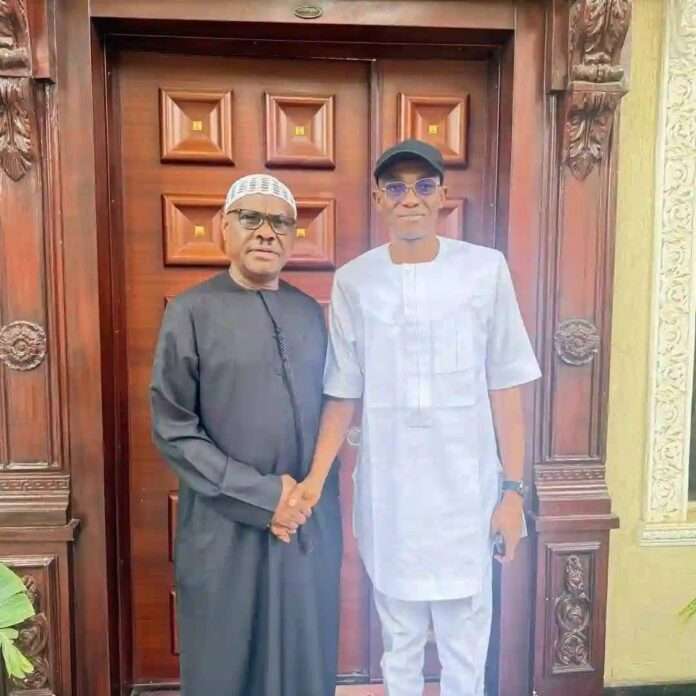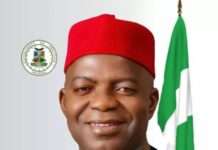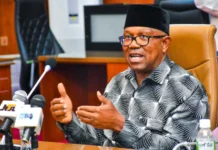Abure Visits Wike: Why Did He Visit & Why Is It Sparking Fresh Allegiances
The already fragile unity of Nigeria’s Labour Party has been thrown into deeper chaos after its factional National Chairman, Julius Abure, paid a high-profile visit to the Minister of the Federal Capital Territory, Nyesom Wike, in Abuja. The meeting, which took place on Saturday, was first made public by Wike’s media aide, Lere Olayinka, who shared photos showing the two political figures exchanging warm pleasantries.
For many observers and supporters of the Labour Party, the visit is more than a simple courtesy call—it is a loaded political statement, signalling shifting alliances, deeper rifts within the party, and potentially far-reaching implications for the party’s future ahead of 2027.
A Party in Crisis
Since the 2023 elections, the Labour Party has struggled to maintain cohesion. Tensions exploded after Abure’s faction challenged the leadership of the camp loyal to the party’s 2023 presidential candidate, Peter Obi. The division worsened when Abure’s camp demanded Obi’s resignation over his involvement in forming a coalition with the African Democratic Congress (ADC) and other smaller parties.
Obi’s loyalists fired back, describing Abure’s group as impostors and accusing them of working to weaken the Labour Party from within. As the back-and-forth escalated, accusations of betrayal and sabotage became daily headlines.
Abure’s visit to Wike appears to confirm what many in the Obi camp have long alleged, that he is aligning himself with power brokers from rival parties to consolidate his grip on the LP structure.
Why Wike?
The choice of Wike as a host is especially controversial.
Nyesom Wike, a chieftain of the People’s Democratic Party (PDP), accepted a ministerial appointment under President Bola Tinubu’s All Progressives Congress (APC)-led administration – a move that itself attracted criticism from PDP loyalists.
Wike is widely regarded as one of the most influential figures in Nigerian politics, with deep networks across party lines. He was instrumental in the G-5 rebellion against the PDP’s leadership during the last election and is known for brokering alliances that serve his strategic interests.
For Abure to be seen in Wike’s company raises the spectre of a broader plot to realign the Labour Party with forces outside the progressive coalition Obi is trying to build.
Mixed Reactions and Mounting Suspicion
Shortly after the photos went viral, reactions poured in:
Labour Party’s Obi-aligned faction issued statements condemning the visit, describing it as “the clearest evidence that Abure’s loyalty lies elsewhere.”
Several Labour Party youth groups accused Abure of trading away the party’s credibility for personal political gain.
Critics also pointed out that the visit sends a confusing message to Nigerians who embraced the Labour Party in 2023 as an alternative to the same old establishment politics Wike represents.
At the same time, Abure’s supporters have defended the visit, arguing that the party must build bridges and foster relationships with all political players if it hopes to remain relevant on the national stage.
What This Means for 2027
The stakes are enormous. The Labour Party’s unprecedented rise in 2023 was built largely on voter disillusionment and the popularity of Peter Obi’s reformist message. But this momentum has been threatened by infighting, court battles over leadership, and disputes over finances.
If Abure continues to consolidate power with the backing of figures like Wike, it could lead to:
Parallel structures, with rival factions laying claim to the party’s name and assets.
Further legal battles, as each faction challenges the legitimacy of the other.
Erosion of public trust, as voters grow frustrated with the bickering and shifting alliances.
Possible defections, with Obi’s supporters contemplating moving to other platforms if the crisis is not resolved.
This visit may well be a turning point in the Labour Party’s short but eventful modern history. While his camp frames it as strategic outreach, many Nigerians see it as a betrayal of the values that inspired millions to embrace the party in 2023.
If the Labour Party leadership fails to resolve these internal conflicts quickly, it risks descending into irrelevance, leaving its supporters disillusioned and handing its opponents a decisive advantage in the run-up to 2027.
One thing is clear: the coming weeks will be critical in determining whether the Labour Party remains a viable third force – or becomes yet another casualty of Nigeria’s fractious political landscape.










